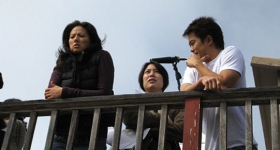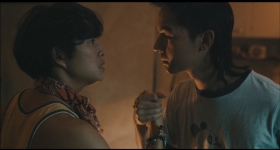Watching "Hell's Ground" was like watching snippets of several
different movies: the buddies from different social classes hitting the
road and the political overtones à la "Y Tu Mama Tambien," the
supernatural effects of environmental pollution last seen in "The
Host," the plodding zombies from "Dawn of the Dead," creepy hitchhikers
and psychotic relatives plucked straight out of "The Texas Chainsaw
Massacre," and the gory butchering of human body parts similar to the
"Saw" series...man, they just keeping on churning out those "Saw"
movies.
In essence, there's a lot going on in "Hell's Ground," which
detracts from the film's rather interesting juxtaposition of
underdeveloped rural Pakistan with the young, urban Western-influenced
central characters. OJ, Roxy, Ayesha, Vicky, and Simon are attractive,
occasional dope smokers who easily flit back and forth between Urdu and
English and collectively lie to their parents in order to road trip it
to a rock concert five hours away from home. Part of the plot hinges on
the notion of "these spoiled city kids have it coming to them" (sixth
film reference: "Cloverfield") and the general downward moral spiral of
society that leads to a gruesome reckoning.
The low-budget special effects are initially laughable (don't
let the film's intro discourage you from finishing the movie; it does
get better), the comic-book title screens that state the obvious
before it happens should have been omitted, and the film gradually ups
the gore factor though not necessarily the fear factor. Had director
Khan pared down on the film's elements and influences, "Hell's Ground"
could have been more hellish and more grounded in plot.
A film more clearer in vision is "The Glow of White Women,"
in which Yunus Vally discusses how his upbringing as a Muslim Indian in
South Africa shaped his proclivity for gals of the Caucasian
persuasion. The set up is mainly Vally and other interviewees speaking
directly to the camera, mixed with substantial archival footage from
news reels, commercials, films, and news clippings from Apartheid-era
South Africa. Vally illuminates everything from South Africa's
geographical segregation of Whites, Blacks, Indians, and Coloreds
(people of mixed race) to the Immorality Acts which banned interracial
sex.
Most
of the media pieces are examples of the glorification of white beauty
and the paranoia built around men of color having sex with white women.
But Vally goes beyond simply providing historical background and cuts
deeper into the issue through his interviews. One of the most
interesting parts of the film I found was the discussion of the
interracial sexual relationships between young, anti-Apartheid
activists (one white former activist admits she had a fetish for Black
and Indian men) which Vally says was strictly carnal to him and not
because he thought having interracial sex could save the world.
The confessional style of the interviews allows for more
honest personal answers in addition to commentary on race in South
Africa. The format makes the film seem longer than it is (there's a lot
more talking than observing as in traditional documentary films), but
the content is definitely worthwhile.
"Hell's Ground" screens at
11:00 pm, Saturday, November 15 and "The Glow of White Women" screens
at 6:00 pm, Sunday, November 16, both at the Castro Theater, San
Francisco.
This blog entry is graciously sponsored by Toyota Matrix. Check out their website dedicated to the best in Asian American film.











Comments